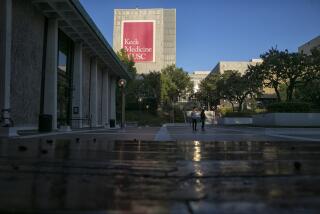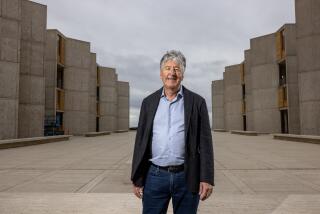Nobel Winner to Leave Salk for Neighbor
- Share via
In what was described as a high-stakes medical coup, a Nobel Prize-winning medical researcher announced Wednesday that he will leave the prestigious Salk Institute for Biological Studies in La Jolla to join a smaller, younger research institute at a community hospital.
Dr. Roger Guillemin will take with him to the Whittier Institute for Diabetes and Endocrinology at Scripps Memorial Hospital his two top research associates, 33 other members of his research team, and $3.5 million in government grants and support funds, the director of Whittier said.
An Attractive Proposal
“I was in a position, I think, to make an attractive proposal,” said Dr. Willard VanderLaan, scientific director of the 7-year-old institute next door to Scripps Memorial in La Jolla. “We will have an expanded effort in diabetes and endocrinology, larger than either of us had in the past.”
VanderLaan said he was able to lure Guillemin away from Salk after 17 years by offering him an opportunity to continue his work after he turns 65 in 1989. VanderLaan said Guillemin faced “a time of reappraisal” by the Salk when he turned 65, after which his position would be reevaluated regularly.
VanderLaan said he also made an offer to Guillemin’s top associate, Nicholas Chi-Kwan Ling, who might have faced a change in his position at Salk if and when Guillemin retired. Ling, associate director of the Salk’s laboratories for neuroendocrinology, will head the Whittier’s peptide chemistry laboratory after the switch in 1989.
“We offer space, support,” VanderLaan said. “His group at the Salk occupies 8 (thousand) to 10,000 square feet for diabetes and endocrine research. With the addition of our new building, we will occupy some 26,000 square feet. In a sense, this is a bringing together of groups that have worked a mile apart.”
Not Seen as a Blow to Salk
A Salk spokesman said it would be “inappropriate” to view Guillemin’s departure as a blow.
“I don’t think it’s a competitive matter,” said Dr. Kenneth Klivington, assistant to the president for scientific planning. “Different institutions have different missions, and individual scientists see their mission more in line with one institution than another. It’s not a matter of competition in that sense.”
VanderLaan, who called Guillemin’s decision a “coup” for the Whittier, took a similar view. He said top Salk officials did not “look upon it as a hostile raid or anything of that sort. . . . I think it’s just the normal (process) of science. Everyone believes in the mobility of scientists.”
Neither Guillemin nor members of his team could be reached for comment late Wednesday. A member of the lab said they were in a staff meeting and it was lab policy never to “take questions on the telephone.”
Nobel Winner in 1977
Guillemin, chairman of the endocrinology laboratories at the Salk, shared the 1977 Nobel Prize in medicine and physiology for his work in the discovery of hormones manufactured in the brain, which influence a wide variety of body functions.
In 1975, he had isolated and synthesized for the first time brain peptides called endorphins, believed to play an important role in mental illnesses such as depression and schizophrenia.
More recently, Guillemin isolated and synthesized another peptide that triggers secretion of the growth hormone by the pituitary gland. The peptide, for which scientists had searched more than 20 years, is now used widely in treating growth deficiencies in children.
In 1985, Guillemin and other Salk researchers isolated a molecule called inhibin, present in ovaries and testes. He and his team, including Ling and Andrew Baird, who will join Guillemin at Whittier, also isolated the molecular structure of substances called fibroblast growth factors, important in diabetic eye diseases and blindness.
The transfer of the Guillemin team’s grant money from the Salk to the Whittier will “nearly triple” the Whittier’s current annual budget, VanderLaan said. Scripps Memorial officials say the move will make San Diego one of the top centers for diabetes research in the country.
The Whittier Institute was founded in 1980. Research there centers on the role of the pituitary gland in the complications of diabetes and on the relationship between breast cancer and the pituitary gland. A second facility for additional laboratories is scheduled to be built in 1988.






